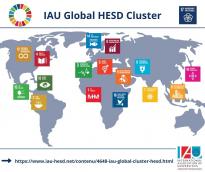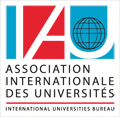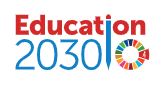IAU Global Cluster on HESD
IAU Global Cluster on HESD

The IAU Global Cluster on HESD promotes the role and potential that HEIs globally have in order to achieve the SDGs and the 2030 Agenda. The Cluster encourages collaboration and takes a holistic approach to the SDGs, focusing specifically on the whole-institution approach.
The IAU Global Cluster on HESD brings HEIs from all continents together and encourages them to develop joint initiatives and synergies.
The Cluster works on all dimensions of the SDGs, combining environmental, social, cultural, and economic dimensions of sustainability, with partnerships as the key enabler for joint action.
Peer-to-peer learning sparks new ideas and creativity among the Members of the Cluster and will encourage other universities to step up their game towards achieving a more sustainable future. The Cluster helps generate joint and collaborative projects and other initiatives.
The Cluster is composed of 16 lead Institutions, each championing and working on one specific SDG while at the same time linking it to other relevant SDGs, with additional Institutions invited on board as ‘Satellites’ around each SDG. Currently, around 70 universities (leads and subclusters) are engaged in the Cluster. Work on SDG 17: Partnerships, is led by the IAU and includes working with other organisations in the higher education and sustainable development sphere. The Cluster is supported, monitored and steered by the IAU Working Group on HESD with the Initiatives developed by the Cluster being available to all IAU Members. The Cluster is primarily open to IAU Members. Non-members can be accepted as Observers in accordance with the Lead on exceptional basis. Terms of Reference to follow soon.
Key documents
Discover the outcome documents from the IAU HESD Cluster Meeting (March 2022)
- The statement on the Joint vision from the IAU Higher Education for Sustainable Development (HESD) Cluster members
- The Strategy and Working Plan 2022-2024
Read more about the Cluster in the special edition of IAU Horizon!
Previous IAU Reports on IAU Global Cluster on HESD:
Cluster Leaders
SDG 1: No Poverty

University of Ghana, Ghana
The University of Ghana leads SDG1: No Poverty.
The University of Ghana works closely with the government, private sector and local community. Their thematic focus in projects lies on agriculture, poverty, capacity building and youth. They are also working on transportation and jobs, in collaboration with partners addressing other SDGs.
The latest activity report from the University of Ghana can be read here . The report for 2019/2020 can be found here
Focal Point: Prof. George Oduro Nkansah, Director of Institute of Applied Science and Technology
Satellites:
- Universidade Estadual de Campinas (UNICAMP), Brasil
- McMaster University, Canada
- Tokyo University of Agriculture and Technology, Japan
- Qatar University
- Makerere University, Uganda
SDG 2: Zero Hunger

Antonio Nariño University, Colombia
Antonio Nariño University leads SDG 2: Zero Hunger
Antonio Nariño University hosts the Faculty of Environmental Engineering. The faculty promotes the conservation of the environment and the development of sustainable infrastructures.
The latest activity report from the Antonio Nariño University for 2019/2020 can be found here
Focal Points: Sandra Guarin, Director of International Relations
Satellites:
SDG 3: Good-Health and Well-Being

Universitat Oberta de Catalunya (UOC)
The Open University of Catalonia leads SDG 3: Good-Health and Wellbeing.
The UOC is an innovative university that is rooted in Catalonia and open to the world. It provides lifelong learning enabling the progress of both individuals and society as a whole, while also carrying out research into the knowledge society.
The UOC's strategic plan has included the 2030 Agenda as part of its roadmap since 2017. The aim is for the whole institution to work towards sustainable development and make a significant contribution to the SDGs.
Located in Barcelona, the University is home to the Faculty of Health Studies and the eHealth Center which, jointly with the Globalization and Cooperation department, lead the SDG 3 Thematic Cluster on HESD. The UOC’s goal in terms of health is to educate and empower professionals and citizens through the use of technologies, and to lead the way towards a new health paradigm. It focuses on people through research, education and guidance, with the aim to contribute to the progress and well-being of society. These will be guiding principles for the SDG 3 team.
The website of the SDG3 Cluster "Universities4GoodHealth" can be found here.
Focal Points: Liv Raphael and Marc Graells Font, consultants eHealth Center
Satellites:
SDG 17: Partnerships for the Goals

International Association of Universities
The International Association of Universities leads SDG 17: Partnerships for the Goals
IAU has promoted higher education teaching, research and community engagement to foster sustainable development since the early 90. Building partnerships and networking for sustainable development and to address the SDGs and Agenda 2030 is inscribed in its DNA. We are pleased to partner with Universities and HEIs and with committed national and international Organisations to build the synergies that are required to help achieve the goals.
Focal Point: Dr. Hilligje van't Land, Secretary General
Isabel Toman, Programme Officer
SDG 16: Peace, Justice and Strong Institutions

University of Nairobi, Kenya
The University of Nairobi leads SDG 16: Peace, Justice and Strong Instituions
The University is home to the Wangari Maathai Institute for Peace and Environmental Studies. The overall aim of the institute is to cultivate better environmental stewardship and management of resources and ultimately a reduction in related conflicts. The mission of the Institute is as follows: "To cultivate positive ethics, values and practices towards the environment by training stewards who foster peace, promote holistic sustainable development, and link theory with practice". Website: https://a-wmi.uonbi.ac.ke/node/4090t
The latest activity report from the University of Nairobi for 2019/2020 can be found here
Focal Point: Dr Thuita Thenya,
Director, Wangari Maathai Institute for Peace and Environmental Studies
Satellites:
SDG 15: Life on Land

University of Costa Rica, Costa Rica
The University of Costa Rica leads SDG 15: Life on Land.
Costa Rica contains nearly 6% of the world’s biodiversity, making it the country with the highest density of biodiversity worldwide. The University of Costa Rica (UCR) hosts the Centre for Research on Sustainable Development (CIEDES) and conducts relevant research in other areas related to the topic.
Read here about the commitment of the UCR for the SDGs (in Spanish).
Focal Point: Yorleni Aguila, Head of International Cooperation
Satellite:
List of other partners upon request
SDG 14: Life Below Water

University of Bergen
The University of Bergen leads SDG 14: Life below Water.
The University of Bergen (UiB) is Norway’s largest marine university, with research and education of a high international standard and several world leading research environments. In 2018, a research center to focus on sustainable ocean research was established, the Ocean Sustainability Centre.
The activity report from the University of Bergen for 2019/2020 can be found here
Focal Points:
Øyvind Fiksen, Professor and Marine Dean
Satellites:
- The University of the South Pacific, Fiji
- University of Cape Town, South Africa
- Ocean University of China
- Christian-Albrechts-Universität zu Kiel, Germany
- The University of the West Indies, Jamaica
- Dalhousie University, Canada
- University of Western Australia
- Universidad del Magdalena (UNIMAG), Colombia
SDG 13: Climate Action

University of the West Indies, Jamaica, Barbados, Trinidad & Tobago
The University of the West Indies leads SDG 13: Climate Action.
The University of the West Indies is located in the Caribbean and hence in one of the areas already affected by climate change. The University has multiple initiatives focusing on sustainable development: the Climate Studies Group Mona (CSGM), Institute for Sustainable Development (ISD), the Centre for Resource Management and Environmental Studies (CERMES), and the cross-campus UWI Resilience Working Group (UWIRWG).
The latest activity report from the University of the West Indies for 2019/2020 can be found here
More on their SDG13 Activities on the website for 'Climate Action' .
Focal Point:
Kevin Manning, Project Coordinator in the Office of the Vice-Chancellor
Satellites:
- SUNY, USA
- University of Bergen, Norway
- TERI School of Advances Studies, India
- University of the South Pacific, Fiji
- University of Waterloo, Canada
- Universidad de los Andes, Colombia
- University of Witwatersrand, South Africa
- University of Aruba, Aruba
- University of Bristol, UK
- University of Ghana, Ghana
SDG 12: Responsible Consumption and Production

University of Regina and Luther College
The University of Regina and Luther College lead SDG 12: Responsible Consumption and Production.
The Regional Centre for Expertise on Education for Sustainable Development in Saskatchewan is hosted by the Luther College at the University of Regina. It has multiple flagship projects. Among others The Sustainability and Education Policy Network (SEPN); Community Collaboration for Potash Mine Engagement; and Reducing Pesticide Use: Plant Health Care Model.
The latest activity report from the University of Regina and Luther College for 2019/2020 can be found here
The latest Academic Plan from the University of Regina and Luther College for 2020-2025 can be found here
Focal Points: Dr. Roger Petry, Professor of Philosophy at Luther College & Co-coordinator, RCE Saskatchewan, and Ms. Jocelyn Crivea, Institute for Energy, Environment and Sustainable Communities Manager, University of Regina
Satellites:
SDG 11: Sustainable Cities and Communities

Siam University, Thailand
Siam University leads SDG 11: Sustainable Cities and Communities
Siam University committed itself to ‘sustainable urban development.’ This idea has a high priority for Thailand. The plan is for the country to develop the status of a knowledge based society and urban living. This new urban agenda will ensure Thailand’s focus on creativity, innovation, and development path.
Please click here for a more detailed description of Siam University's initiatives towards the SDGs.
The latest activity report from the Siam University for 2019/2020 can be found here
Focal Point: Prof. Pornchai Mongkhonvanit, President, Siam University
Dr. Kanjana Mahatanatavee, Dean of the Faculty of Science
Satellites:
SDG 10: Reduced Inequalities

University of Tsukuba, Japan
The University of Tsukuba leads SDG 10: Reduced Inequalities.
The University offers a Bachelor’s Program in Global Issues, a comprehensive program focusing on literacy in global issues. Students learn what ‘global issues’ are and how they can be resolved from the perspectives of “Environment” and “the Human being”.
The latest activity report from the University of Tsukuba for 2019/2020 can be found here
Focal Point: Prof. Muneo Kaigo, Institute for Comparative Research in Human and Social Sciences (ICR)
Satellites:
SDG 9: Industry, Innovation and Infrastructure

Beirut Arab University, Lebanon
Beirut Arab University leads SDG 9: Industry, Innovation and Infrastructures.
Creative Sustainable Development is one of the key research themes at BAU.
Website for SDG9 at BAU with information on the SDG 9 mapping activities: https://www.bau.edu.lb/sdg9
The latest activity report from the Beirut Arab University for 2019/2020 can be found here
Focal Points: Ms. Salam Zahran, Human Rights Specialist
Prof. Ibtihal El- Bastawissi Professor- Faculty Dean (Faculty of Architecture – Design and Built Environment)
Satellite:
SDG 8: Decent Work and Economic Growth

University of Gothenburg, Sweden
The University of Gothenburg Leads SDG 8: Decent Work and Economic Growth.
The University hosts several research centres of relevance for SDG 8:
- Work and Employment Research Centre (WE)
- Environment for Development Initiative (EfD)
- Centre of Globalization and Development (GCGD)
- Centre for Tourism (CFT)
- Centre for Global Human Resource Management (CGHRM)
- AgeCap Centre for Ageing and Health
- Centre for Business in Society (CBiS)
- Centre on Global Migration (CGM)
The latest activity report from the University of Gothenburg for 2019/2020 can be found here
A university for the world, the University of Gothenburg´s Vision 2021-2030 can be found here
Focal Points: Eddi Omrcen, Sustainability Strategist, Gunnar Köhlin, Director of Environment for Development
Satellites:
- Makerere University, Uganda
- Addis Ababa University, Ethiopia
- University of Nigeria, Nigeria
- University of Dar es Salaam, Tanzania
- University of Nairobi, Kenya
- University of Concepción, Chile
- Universidad de los Andes, Colombia
- University of Economics Ho Chi Minh city, Vietnam
SDG 7: Affordable and Clean Energy

Assam Don Bosco University, India
Assam Don Bosco University leads SDG 7: Affordable and Clean Energy.
Assam Don Bosco University has committed itself to becoming an EcoFriendly campus. Especially in the field of affordable and clean energy, the university is moving forward.
The latest activity report from Assam Don Bosco University for 2020/21 will be available soon (previous report for 2019/2020 here).
Focal Points:
- Fr. Joseph Nellanatt, Pro Vice Chancellor
- Ms. Juhi Baruahjuhi, Human Resources Director
-
Dr. Sunil Deka, Assistant Professor (Selection), Department of Electrical & Electronics Engineering
-
Dr. Hironmay Deb, Assistant Professor (Selection), Department of Electrical & Electronics Engineering
Satellites:
SDG 6: Clean Water and Sanitation

University of Manouba, Tunisia
The University of Manouba leads SDG 6: Clean Water and Sanitation since September 2023.
In 2021, the University of Manouba signed a Memorandum of Understanding (MoU) which aimed to make the campus inclusive, resilient and sustainable. The agreement focuses on the development of five axes, namely, a campus that is beautified, safe and accessible to people with special needs.
The other axes concern the improvement of neglected public spaces adjacent to the university's neighborhoods, the embellishment of a multi-service area , the sensitization of the university community to the Sustainable Development Goals (SDGs), and an improvement in the relationship between the UMA and its neighboring territory.
Universities active on SDG 6:
- University of Tehran, Iran
- University of Bergen, Norway
- Antonio Nariño University, Columbia
- Western Sydney University, Australia
- others to be announced soon.
SDG 5: Gender Equality

University of Bologna, Italy
The University of Bologna leads SDG 5: Gender Equality.
The University promotes SDG5: Gender Equality throughout the whole institution. Alma Gender IRT is an integrated research team.
The latest activity report from the University of Bologna for 2019/2020 can be found here
Focal Point: Christina Demaria and Daniela Bolzani
Satellites
SDG 4: Quality Education

York University Toronto, Canada
The York University Toronto leads SDG 4: Quality Education.
The university hosts the UNESCO Chair in Reorienting Education towards Sustainability
As SDG 4 is both a singular goal as well as interrelated with all other SDGs, it is of utmost importance to ensure its successful implementation. Higher education plays a crucial role in these concerted efforts to achieve a more sustainable future. Institutions of higher education in their preparation of future generations have the potential to greatly influence society’s knowledge, values and perspectives on and beyond campus. By engaging their research, teaching and community service capacities, higher education, perceived and valued as a common good, can help in the societal transformations required to successfully address and achieve the 17 Global Goals. As such, institutions of higher education can play major roles as individual or collective entities and within national sustainable development strategies.
The latest activity report from York University Toronto for 2019/2020 can be found here
The latest Academic Plan from York University Toronto for 2020-2025 can be found here
Focal Point: Katrin Kohl, Executive Chair Coordinator, UNESCO Chair in Reorienting Education towards Sustainability
Satellites:

 INGO with UNESCO Associate Status / ECOSOC Consutative Status
INGO with UNESCO Associate Status / ECOSOC Consutative Status